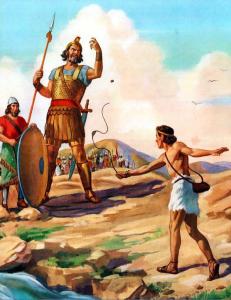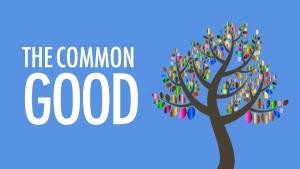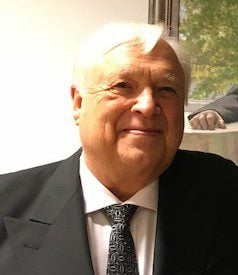Demythicizing the Myth of Economism.
PT 3005. Common Good Part Two

 Resistance to economism is like fighting Goliath with only two small stones in a sling. It seems hopeless. Hopeless or not, here we will carefully select two stones to attack the giant. We will select demythicization — also called “myth-busting”– plus the common good and then sling them toward the monster.
Resistance to economism is like fighting Goliath with only two small stones in a sling. It seems hopeless. Hopeless or not, here we will carefully select two stones to attack the giant. We will select demythicization — also called “myth-busting”– plus the common good and then sling them toward the monster.
The Goliath in our contemporary situation is economism. The enemy is not the Philistine. The enemy is ourselves. We the human race, befuddled and staggering toward ecocide, are our own enemy. We tacitly hire the mercenary giant, economism, to protect us with a rhetorical opiate that calms our fears and lulls us into a painless self-obliteration.
This rhetorical opiate is not just happenstance. It’s deliberate. Simon Johnson at MIT’s Sloan School of Management makes clear that economics is no longer merely a science. Rather, economic knowledge provides the “raw material for a deliberately created ideology and a powerful belief system” that favors the rich at the expense of the poor (Kwak, 2017, Foreword). This powerful belief system–which we will identify interchangeably as a myth, a religion, or the church of economism–is what we’re after with myth-busting in this Patheos newsletter series.
This is the second post of the series on the Common Good. In the first post, I recommended some organizations dedicated to common good governing. In this and the next two posts, we will engage in myth-busting.
Politics vs Common Good Governing. Common Good Part One
Demythicizing the Myth of Economism. Common Good Part Two
Demythicizing the Myth of Economism. Common Good Part Three
Ecotheology when “it’s time to act”
Public Theology for the Common Good
Demythicizing the Myth of Economomism. Common Good Part Four
Just, Sustainable, Participatory, and Planetary. Common Good Part Five
In principle, the theologian and the economist should share a concern for inequality and injustice. “Economists and theologians share a concern about social justice; about material well-being for all people and an elimination of poverty,” says hybrid economist ‘n’ theologian Mary Hirschfeld. But, what if the economist attends the church of economism? What if helping the poor is against the tenets of the religion of economism?
The First Stone: Myth-Busting the Myth of Economism
The first stone is analytical, a demand for transparency. Through discourse clarification we will decorticate economic rhetoric in order to expose its hidden religiosity and dangerous idolatry. Our method: demythicization. Also known as myth-busting.

Economist James Kwak would not appeal to theology to help him understand our situation. “Appeals to Christian theology or evolutionary necessity are unlikely to be convincing today”(Kwak, 2017, 5). Despite Kwak’s demure, we will still ask the public theologian to aid in our understanding through discourse clarification.
In pursuit of discourse clarification, I will analyze economism and show how it functions as a myth.[1] Whether we admit it or not, the myth of economism has become an invisible religion for modern society, eliciting within our minds a false consciousness. Regrettably, this myth provides cultural justification for human economic injustice along with environmental neglect. To make visible what is virtually invisible, I will rely on the detailed work of eco-economist Richard Norgaard along with process theologian John Cobb to parse the tenets of the neo-liberal doctrines which constitute the myth of free market capitalism.
Some tenets of this myth are demonstrably incompatible with the Christian emphasis on neighbor-love. Worse, these tenets when put into action risk not only economic injustice but self-destruction through ecocide.
I employ the term, demythicize, rather than the common hermeneutical term, demythologize. The latter term, demythologize, in the tradition of Rudolf Bultmann, means to interpret the myth while still living within the myth. When myth-busting economism, I prefer to demythicize because I do not want to live within the worldview provided by the myth of economism.
The Second Stone: The Common Good

This brings us to the second stone to be slung at Goliath. That second stone is a positive proposal, namely, that we construct a worldview oriented around the common good. The valuable values within economism—industriousness, technological progress, economic growth, and such—should be reoriented to serve a vision of a just, sustainable, participatory, and planetary society.[2]
Jesus said, “You cannot serve God and mammon” (Matt 6:24 NKJV). Progressive activist Sharon Delgado remarks: this makes it “clear that even in his day people were tempted to serve money as an idol rather than treating it simply as a medium of exchange” (Delgado 2022, 149). Economism is one form in which coveting money leads not only to idolatry but to self-destruction. Therefore, understanding economism, becomes urgent for any appreciation of the global common good.
Does the Jesus tradition contribute to the Gandhi tradition on an economic interpretation of the common good? Certainly Mahatma Gandhi drew not only on Jesus but on the Dharma traditions of India. The exclusivist values of economism are countered by the inclusive values of a Hindu variant on the common good. “The economic system, politically nonviolent and democratic, should be cooperative and constructive instead of [being] exclusive, competitive and militant” (Kamala 1987, 61).
Purushottama Bilimoria at the Graduate Theological Union’s Sustainability 360 Initiative cites and comments on Gandhi. “What is interesting about the Gandhian model of economics is that in this ideology exploitation is replaced by service, acquisitiveness by renunciation or minimalism, local in place of global, and self-regulation for centralization” (Bilimoria 2022, 147). Bilimoria expands the implications of Gandhian economics. Bilimoria imagines an interaction between large-scale even government run programs that preserve and encourage small-scale local initiatives. Public utilities on large-scale plans or centralized and capital-intensive public services for other needs are imperative. But, he cautions, there must remain a measure of balance with small-scale, labor-intensive, decentralized, and village- or rather community-based service portals that provide for the diverse needs of human beings and animals in a protected ecological environment. “Gandhi eschewed reliance on luxurious and superfluous goods and the entertainment fetishism that provides no moral or intellectual succor or helps with the development of character” (Bilimoria 2022, 149).
Requisite to our pursuit of a global common good is multi-religious solidarity.
Political Theology within Public Theology
These two–demythicizing economism combined with lifting up a vision of the common good–belong in the sling shot of a public theology that incorporates eschatological political theology partnered with prophetic activism (Peters, Public Theology: Its Pastoral, Apologetic, Scientific, Political, and Prophetic Tasks 2018).[3] “Political theology calls on the church to think politically,” writes percipient theologian John Cobb. “This entails understanding itself and its thought in the concrete socio-historical situation perceived on a global scale” (Cobb 1982, 83).
I incorporate this dimension of political theology within a more comprehensive public theology. Regarding public theology, three methodological points are relevant. First, regarding publics, I largely follow David Tracy by advocating that public theology be conceived in the church, critically reflected on in the academy, and offered to the wider culture for the sake of the common good (Tracy 1981, 3).[4]
Second, of the various models of political theology available, I embrace most fully eschatological political theology, which begins with a vision of God’s kingdom of love and justice and then renders judgment against all temporal societies, rendering their social achievements as provisional only. In Europe eschatological political theology takes the form of the Theology of Hope and in Latin America as liberation theology.[5]
Third, prophetic activism resists existing provisional systems when they idolatrously demand final allegiance. “Prophetic activism,” avers Helen Slessarev-Jamir, “is fundamentally concerned with the well-being of the marginalized…A person’s well-being is fundamentally determined by their access to basic human rights, which rest on a universal understanding of the dignity of all human beings” (Slessarev-Jamir 2011, 8), Justice embedded in the common good provides the norm.
As previously introduced, our methodological home here will be public theology. Within the frame of a public theology buttressed by eschatological political theology coupled with prophetic activism for the sake of Planet Earth, I plan to pose two ethical questions that are difficult to ask within the mythically structured language of economism: (1) should the rich help the poor? (2) does a vision of the common good compel a human response that could save our planet’s life-supporting fecundity?[6] In sum, as a public theologian I plan to sling two stones toward the Goliath, economism, and try to precipitate a revolution, or at least a reformation.
What is coming?
Next in this series of myth-busting economism on behalf of common good governance, we will sling the analytical stone. Through discourse clarification, I will try to decorticate the shell of economic rhetoric to make transparent its mythical or even religious core.
Finally, after decortication through discourse clarification, we will turn to worldview construction. We will construct a worldview that looks like Robert John Russell’s “eschatological family of life on earth” (Russell 2022, 364). The prophetic public theologian shoulders the responsibility of lifting up a vision of the global common good as a reformation of the church of economism.
▓

Ted Peters is a Lutheran pastor and emeritus seminary professor, teaching theology and ethics. He is author of Short Prayers and The Cosmic Self. His one volume systematic theology is now in its 3rd edition, God—The World’s Future (Fortress 2015). His book, God in Cosmic History, traces the rise of the Axial religions 2500 years ago. He has undertaken a thorough examination of the sin-and-grace dialectic in two works, Sin: Radical Evil in Soul and Society (Eerdmans 1994) and Sin Boldly! (Fortress 2015). Watch for his forthcoming, The Voice of Christian Public Theology (ATF 2022). See his website: TedsTimelyTake.com.
Ted Peters’ fictional series of espionage thrillers features Leona Foxx, a hybrid woman who is both a spy and a parish pastor.
▓
[1] Wikipedia tells us that the term, economism, is often used to “criticize economics” as an ideology in which supply and demand are the only important factors in decisions and outstrip or permit ignoring all other factors. It is believed to be a side effect of neoclassical economics and blind faith in an “invisible hand” or laissez-faire means of making decisions, extended far beyond controlled and regulated markets and used to make political and military decisions. As such, conventional ethics would play no role in decisions under pure economism, except insofar as supply would be withheld, demand curtailed, by moral choices of individuals. If this description of economism is accurate, it alarms ethicists.[2] Elsewhere I have argued that we earthlings should think of the Milky Way as a galactic common good (Peters 2018). In this treatment, advancing to a terrestrial common good inclusive of all humanity embedded within the ecosphere will suffice.
[3] “Public theology in a postcolonial frame of reference can be undertaken by a critical analysis of the economic, political, and cultural development linked to ecological degradation” (Chung 2016, 199-200), writes Paul Chung.
[4] Hak Joon Lee delivers marching orders: public theology “reminds secularism of the religious foundation of human existence and civilization, while assisting in channeling religious passion and energy constructively to the common task of justice and peace” (Lee 2015, 63) .
[5] “When the Church is faced with the modern political systems,” observes Johannes Metz, “she must emphasize her critical, liberating function again and again, to make clear that [human] history as a whole stands under God’s eschatological proviso” (Metz 1969, 118), says theologian of hope, Johannes B. Metz. Eschatological political theologies based on visions of hope exploded in the 1960s in Europe with the Theology of Hope and in Latin America with liberation theology. These more aggressive social transformers appear to be has-beens, at least according to the new political theologians. “Political theology is dominated by and even assumed to be Christian discourse. At least, it was” (Clague 2011, 646), according to Julie Clague.

References
Bilimoria, Purushottama. 2022. “A Critique of Economic Reason: Between Tradition and Modernity. Religion and Sustainability. Eds., Rita D. Sherma and Purushottama Bilimoria. Switzerland: Springer, 137-157.
Chung, Paul. 2016. Postcolonial Public Theology: Faith, Scientific Rationality, and Prophetic Dialogue. Eugene OR: Cascade Books.
Clague, Julie. 2011. “Political Theologies Ten Years after 9/11″.” Political Theology 12:5 645-659.
Cobb, John. 1982. Process Theology as Political Theology. Louisville KY: Westminster John Knox.
Delgado, Sharon. 2022. The Cross in the Midst of Creation. Minneapolis MN: Fortress.
ELCA. 2011. Genetics, Faith, and Responsibility. http://download.elca.org/ELCA%20Resource%20Repository/GeneticsSS.pdf?_ga=1.54478571.232821864.1462997417 (accessed 11/1/2016), Chicago: Social Statement.
Kwak, James. 2017. Economism: Bad Economics and the Rise of Inequality. New York: Pantheon.
Lee, Hak Joon. 2015. “Public Theology.” In The Cambridge Companion to Christian Political Theology, by eds Craig Hovey and Elizabeth Phillips, 44-65. Cambridge UK: Cambridge University Press.
Merchant, Carolyn. 1980. The Death of Nature: Women, Ecology and the Scientific Revolution. New York: Harper.
Metz, Johannes. 1969. Theology of the World. New York: Herder and Herder.
Peters, Ted. 2018. “Public Theology: Its Pastoral, Apologetic, Scientific, Politial, and Prophetic Tasks.” International Journal of Public Theology 12:2 153-177; https://brill.com/abstract/journals/ijpt/12/1/ijpt.12.issue-1.xml.
Peters, Ted. 2018. “Toward a Galactic Common Good.” In The Palgrave Handbook of Philosophy and Public Policy, by ed David Boonin, 827-843. New York: Macmillan Palgrave.
Russell, Robert John. 2022. “The Eschatological Family of Life on Earth: A Christian Response to Global Climate Change.” Religion and Sustainability. Eds., Rita D. Sherma and Purushottama Bilamoria. Switzerland: Springer; 353-369.
Slessarev-Jamir, Helene. 2011. Prophetic Activism: Progressive Religious Justice Movements in Contemporary America. New York: New York University Press.
Srimati, Kamala. 1987. Mahatma Gandhi: An American Profile. Washington DC: The Mahatma Gandhi Memorial Foundation.
Tracy, David. 1981. The Analogical Imagination. New York: Crossroad.













